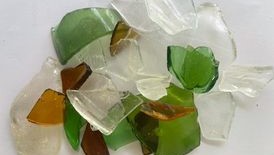OPINION: What’s right and wrong about tourism in the Cook Islands
Saturday 25 June 2022 | Written by Supplied | Published in Opinion

Broken beer bottles seem to migrate here. 22026401
Over five weeks I will outline what I see as the main problems which serve as barriers to tourism – from dogs to rubbish to mynahs to service to human rights.
I will end on a positive note about what is in fact a fabulous country, and a plan to nevertheless improve. I am new to tourism in the last four years (two obviously disastrous) but I’m not new to touring.
I’ve visited 70 countries and I know what works and what I like. This business naïveté can be a strength when it brings fresh eyes. Certainly, a lot of tourism practices are steeped in tradition and are unbelievably archaic like travel wholesaling. The thing needs a shakeup.
My main work is as a surgeon. Bringing those disciplines has proved useful. It helps to make quick important decisions, spot the risks, think on your feet, be empathetic, welcome innovation, be prepared for problems, maintain optimism and cut out the bad bits. What could possibly go wrong?
I considered submitting this anonymously for about five seconds. I actually disrespect those who hide behind a rock. I understand the sensitivities in a small place but in the end, you need the courage of your convictions. What I have to say will no doubt offend almost everyone. If I haven’t, I probably haven’t done my job. Covid has forced us all to re-evaluate. Now’s the time to shake complacency, question the status quo and reject mediocrity. Just OK is not good enough. Excellence is not hard to achieve because most people never reach for it. Let’s get excellent – John Dunn, owner of the Motu Beachfront Art Villas and visiting surgeon Rarotonga Hospital.
Squatting is great
exercise. I do 30 a day. One way to achieve this is to take a walk on any of
our beaches and squat to pick up broken glass. On the west coast 30 squats will
take 30 minutess or less. The entire stretch north of Aro’a is littered. Broken
beer bottles seem to migrate here, or the south coast from Tikioki to Muri, in
their afterlife.
Can anyone explain this disgrace to me? You can walk the length of Takapuna
Beach daily for a year and never encounter a scrap of rubbish and certainly no
shards of glass. Does the diverse Auckland population of 1.5 million really
have more respect for the whenua/enua and moana than do 10,000 Rarotongans for
their very own coast?
Where does this glass come from? Certainly not boats as there are few on the
lagoon. Does it wash down the streams from eroded rubbish holes? Or is it
deliberately smashed and dumped on the beach? I fear this is the true answer.
Which is absolutely shameful.
No matter what your belief system, no matter how primal your thinking, surely
even the dullest or most morally bankrupt can see this is not a good idea. Even
dogs won’t soil their own environment. And it’s not just glass. There is
plastic, metal, old rags and styrofoam.
Unless this culture is changed and the trend reversed our lauded Paradise will
become paradise lost. Our beaches are the jewel in the crown of our living
environment but also of our economy through tourism. It’s why people come, and
the shore is an embarrassment.
Raised coral makatea islands like Nuie and Atiu have their own beauty but it’s
the lagoon and golden sand of volcanic islands like Rarotonga that draw the
most visitors. We are defiling those beaches.
Again the answer lies at local puna level. If anyone is caught or known to dump
on or near the beach call them out. Loudly. Name and shame. It is seriously not
ok. Their thoughtlessness or laziness affects us all by creating a physical
danger but also devaluing our tourism assets. Resort and accommodation owners
and all landowners could do more by patrolling and grooming their patch. They
will soon work out who are the perpetrators.
Beyond the sand our lagoon is dying. The coral heads are bleached. The green
scum that periodically afflicts Muri is awful. The fact we can’t eat fish from
the lagoon because of ciguatera is a national disgrace.
This disease requires special mention as it is almost a barometer of
environmental degradation. A tiny dinoflagellate organism attaches to algae or dead
coral. It produces nasty toxins. When eaten by herbivores like parrot fish when
they graze off the coral, these toxins get concentrated in the fish‘s flesh.
The toxins aren’t denatured by cooking so when the fish is eaten you get sick,
sometimes requiring hospital treatment.
Whatever promotes coral death or algal blooming therefore sets the scene for
ciguatera. The obvious offender is runoff of nutrients, especially phosphate
based fertilizer, from the land. This is a bigger problem than broken beer bottles
but similarly needs urgent addressing.
Beyond the reef there also seems to be a problem. Pelagic fish numbers appear
reduced. Local operators find it increasingly hard to find a tuna for
themselves or their tourists. Two million sq km of ocean is hard to patrol but
is a vast resource. Someone somewhere is benefitting.
Without getting deeply into the polymetallic nodule debate, it does appear one
possible path out of dependence on tourism (which has proven fragile). “Seabed
mining” is an inappropriate and highly charged term for what is really
vacuuming valuable seabed nodules at 5 km deep where not much lives. I would
warn against sudden wealth however. Lotto winners often don’t do well, and many
countries talk of the “curse of oil” where the wealth lands in the hands of a
few.
In the meantime degradation of our coastal environment is an increasing barrier
to tourism.













































